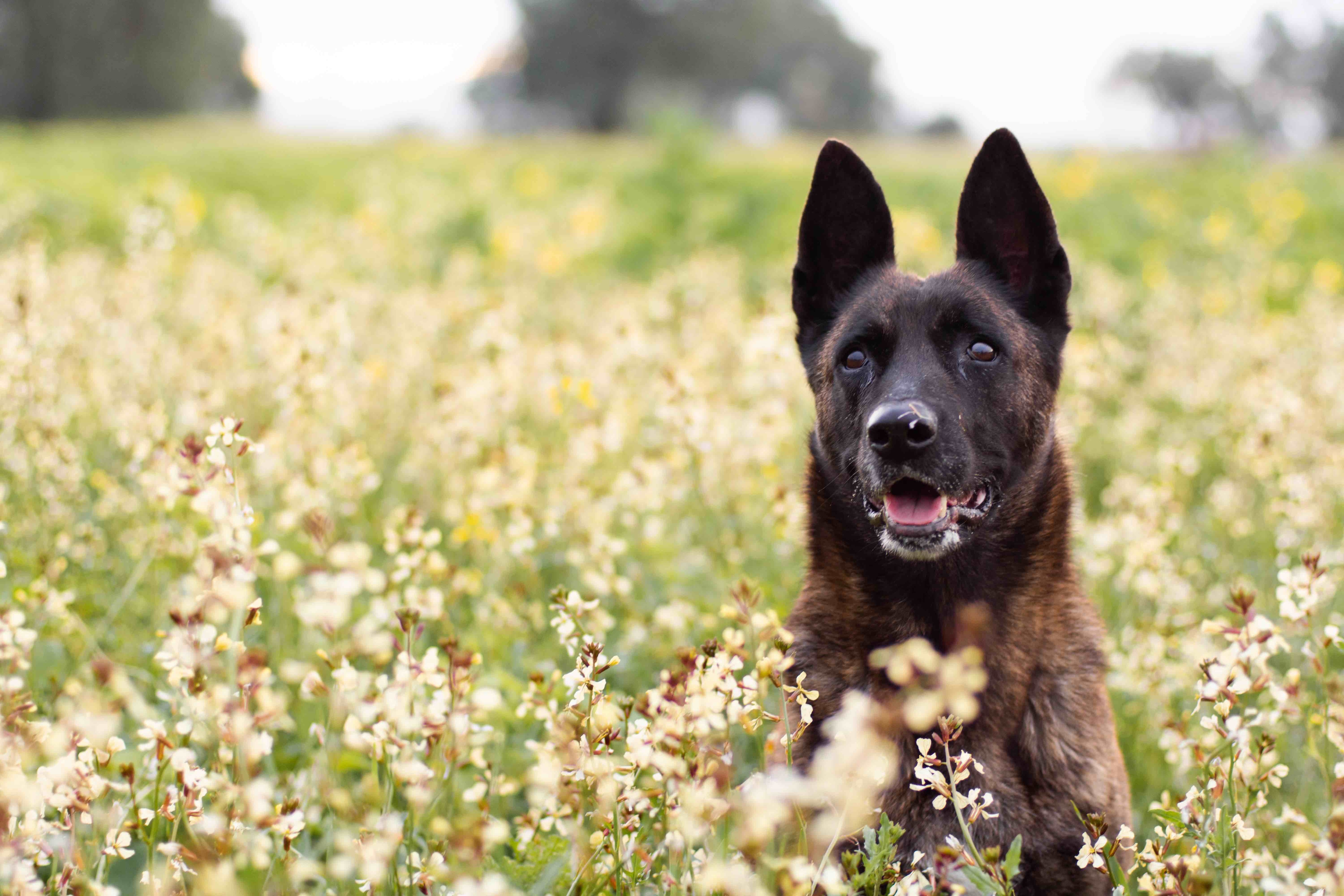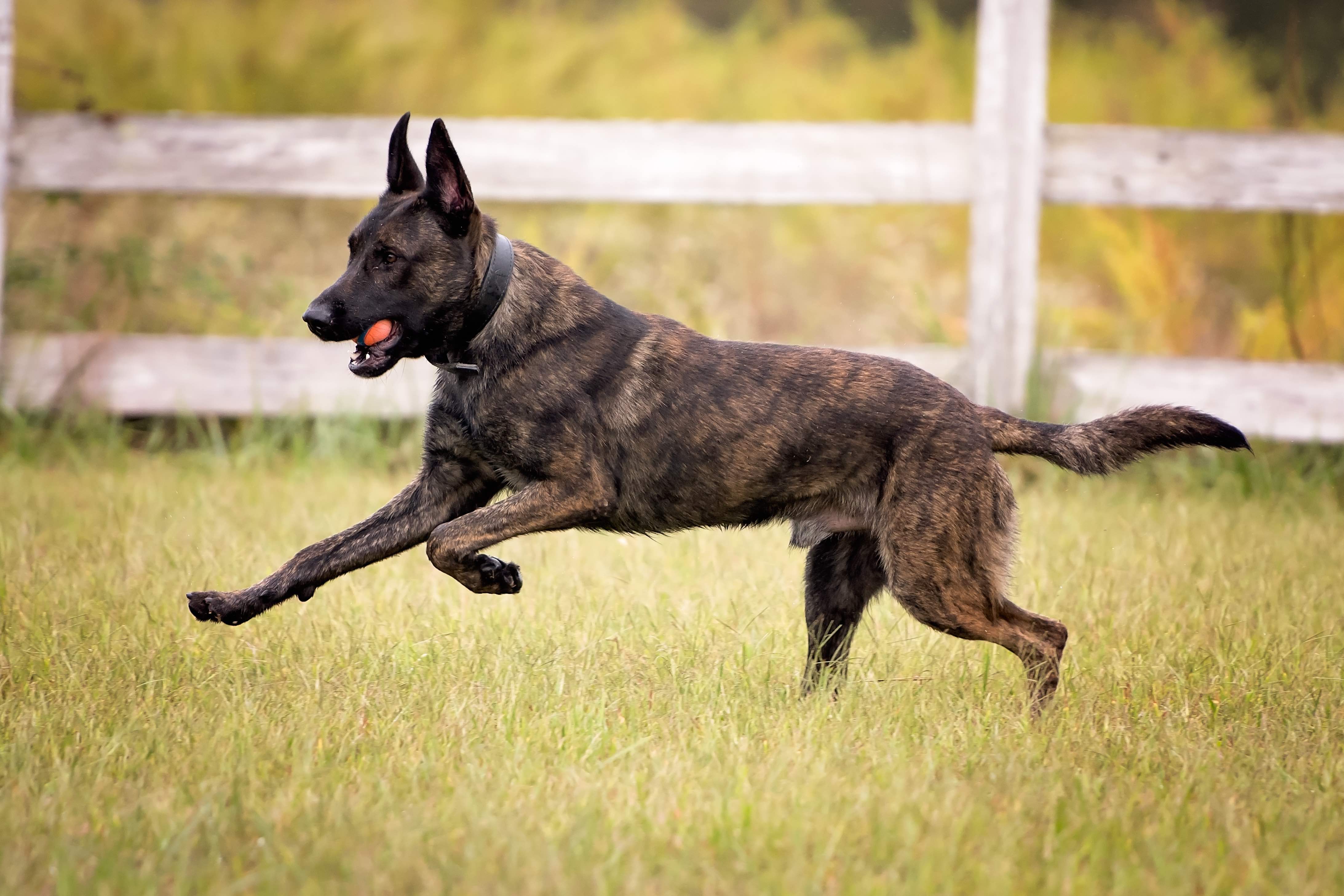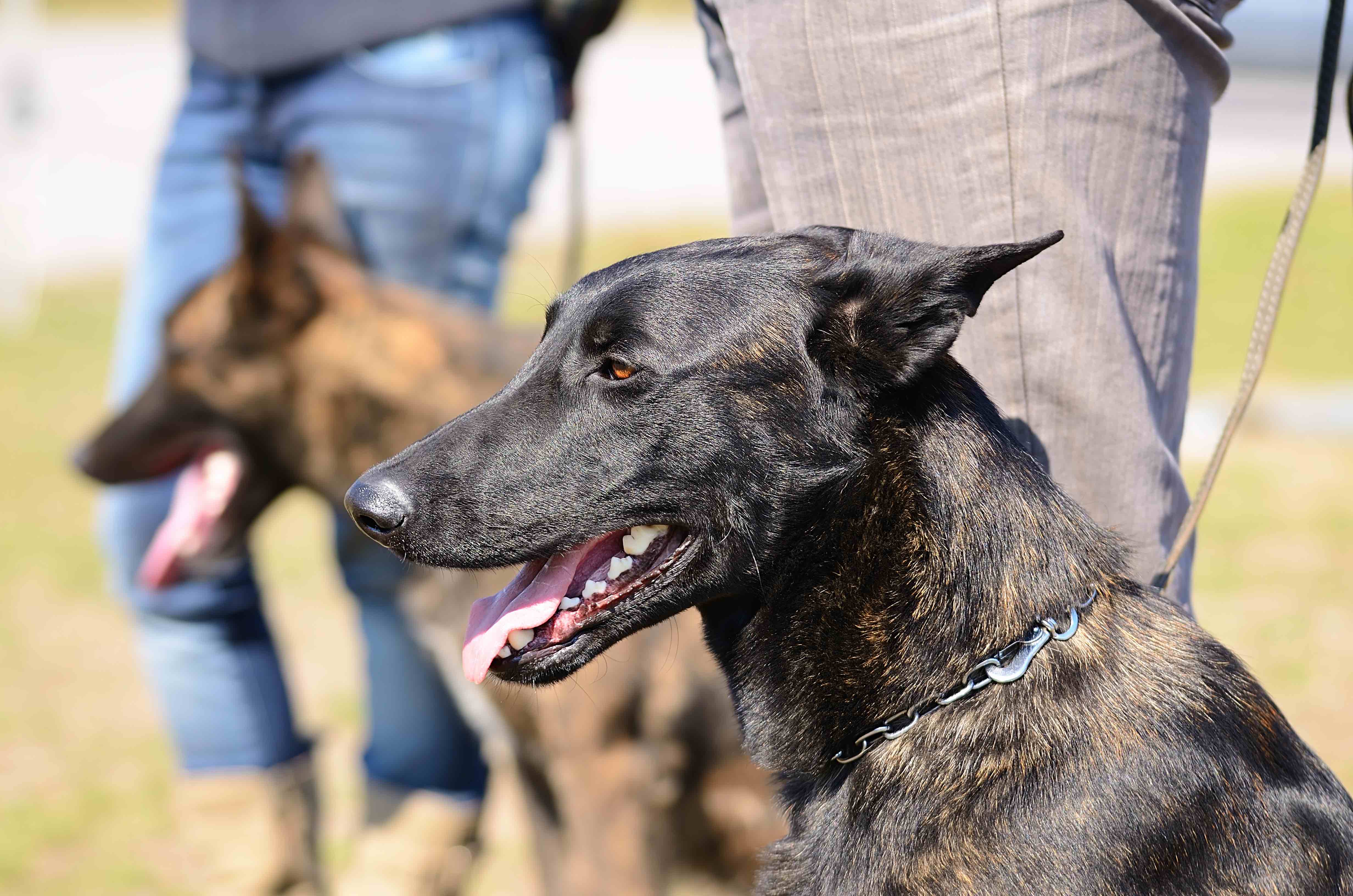Dutch Shepherd
Ksenia Raykova/iStock / Getty Images Plus via Getty Images
Versatile, intelligent, and loyal, the Dutch Shepherd has a rich history. According to the American Dutch Shepherd Association, this breed originated in the 18th century in rural Dutch areas (now known as the Netherlands) to help shepherds and farmers with herding livestock, guarding property, and pulling carts. Their versatility made them invaluable, and they were prized for their keen intelligence and strong work ethic.
Physically, Dutch Shepherds are medium-sized dogs with a well-muscled and athletic build. They typically have a 12- to 15-year lifespan, stand 21–25 inches at the shoulder, and weigh 42–70 pounds. Their coat is typically short to medium in length, dense, and weather-resistant, with a brindle pattern being the most common color.
Today, Dutch Shepherds are popular choices for search-and-rescue work and police work, thanks to their keen sense of smell and remarkable tracking abilities.
Caring for a Dutch Shepherd
The Dutch Shepherd dog is a highly intelligent and loyal breed, suitable for various tasks due to their versatility. With a high energy level, they require lots of regular exercise—about 90 minutes to two hours every day—and mental stimulation, and they excel in activities like agility and obedience.
While affectionate with family, Dutch Shepherds can be cautious around strangers at first. Socializing your Dutch Shepherd puppy is vital to make sure they are comfortable around new people. A Dutch Shepherd’s grooming needs are moderate due to their short- to medium-length coat, and their unique brindle pattern adds to their distinctive appearance.
Dutch Shepherd Health Issues

While generally a healthy breed, the Dutch Shepherd may be predisposed to a few specific health issues. Investing in pet insurance may help with any veterinary costs that arise.
Elbow and Hip Dysplasia
Elbow dysplasia and hip dysplasia are common orthopedic conditions in Dutch Shepherds. This is where the hip or elbow joint develops abnormally and doesn't fit properly into the socket, leading to discomfort, pain, and eventually arthritis.
Weight management, exercise, anti-inflammatory and pain medication, and joint supplements may be recommended to manage the condition and improve the dog's quality of life. In severe cases, surgery may be necessary to alleviate discomfort and improve mobility.
Progressive Retinal Atrophy (PRA)
Progressive retinal atrophy (PRA) is an inherited eye disorder causing gradual degeneration of the retina, eventually leading to blindness. While there’s no cure, the condition is genetic, and reputable Dutch Shepherd breeders won’t breed affected dogs.
Gastric Dilatation-Volvulus (Bloat)
Dutch Shepherds are a deep-chested breed and therefore prone to gastric dilatation-volvulus, a life-threatening form of bloat where the stomach fills with gas and twists, cutting off blood to vital organs such as the stomach and spleen. If your dog has signs of GDV or bloat, immediate veterinary attention is needed to save the dog’s life.
Preventive measures include feeding your dog multiple small meals a day instead of one large meal, avoiding vigorous exercise after eating, not using elevated food bowls, and using slow-feeding bowls. You can also talk to your vet about a preventative gastropexy procedure for your dog, which tacks the stomach to the abdomen wall to prevent it from twisting. This procedure is often done at the same time as a spay or neuter surgery.
Degenerative Myelopathy (DM)
Degenerative myelopathy is a condition affecting a dog’s spinal cord. The initial signs are weakness and difficulty standing up, but symptoms include wobbliness and stumbling as the condition progresses. Later stages of the disease include fecal and urinary incontinence, as well as paralysis.
This condition is genetic, so ask your Dutch Shepherd breeder about whether your puppy’s parents have been tested for DM.
Von Willebrand Disease (vWD)
Von Willebrand disease is a bleeding disorder in which the blood can’t clot as needed. There are a few different types of vWD, and the breed club says long-haired Dutch Shepherds are susceptible to Type 1, the mildest form. Veterinarians can diagnose vWD through a blood test.
What To Feed a Dutch Shepherd
When choosing dog food for a Dutch Shepherd, prioritize high-quality proteins such as chicken, beef, or fish to match their active lifestyle. Opt for balanced formulas approved by the Association of American Feed Control Officials (AAFCO). Avoid foods with excessive fillers or artificial additives, and manage portion sizes to prevent obesity.
Your veterinarian can help you choose the best food for your dog.
How To Feed a Dutch Shepherd
For Dutch Shepherds, a feeding routine should revolve around their age, activity level, and health status. Typically, adult dogs thrive on a twice-daily feeding schedule, while Dutch Shepherd puppies may require more frequent meals to support their growth. Consistency in meal timing regulates digestion and can prevent issues like bloat, so aim for a morning and evening feeding routine.
Tailor your Dutch Shepherd's diet to their life stage. Puppies should eat puppy food before transitioning to an adult formula. Providing nutrient-rich formulas ensures your Dutch Shepherd maintains optimal health and energy throughout their life stages.
How Much Should You Feed a Dutch Shepherd?
Determining the appropriate feeding amount for a Dutch Shepherd involves considering several key factors. While your dog food’s packaging will offer guidance based on weight, your veterinarian can give you a better recommendation based on your individual dog’s health and lifestyle.
Because Dutch Shepherds are known for their high energy levels, it's important to remember that more active dogs may require slightly larger portions to meet their needs effectively.
Nutritional Tips for Dutch Shepherds
Supplements can help support the overall health of your Dutch Shepherd, especially considering their active lifestyle and potential breed-specific health concerns. Some supplements that can be beneficial include:
-
Multivitamins (based on life stage)
-
Joint supplements
It's best to consult with your vet before starting new supplements to ensure they are appropriate for your dog's needs and health status.
Behavior and Training Tips for Dutch Shepherds
Dutch Shepherd Personality and Temperament

Dutch Shepherds are intelligent, loyal, and high-energy dogs that thrive with lots of mental stimulation and exercise. While affectionate toward their family, Dutch Shepherd dogs require proper socialization to be comfortable and well-mannered around strangers, children, and other animals in the home—just like all other dogs.
Dutch Shepherd Behavior
Because of their history as working dogs, Dutch Shepherds are alert and may bark to let you know someone is approaching your home—even if it’s just the mail carrier. They may also develop undesirable behaviors such as digging or trying to herd other pets (like the family cat) when they’re allowed to grow bored.
As a pet parent, it's important to provide consistent training, exercise, mental stimulation, and socialization so your Dutch Shepherd thrives and practices positive behaviors.
Dutch Shepherd Training
Dutch Shepherds excel in training that tests their intelligence, physical prowess, and strong work ethic. Success comes through positive reinforcement and consistency.
Pet parents should match their dog’s energy levels, ensuring regular exercise to sustain focus and deter boredom-related issues during training. Collaborating with a skilled trainer who is familiar with working dogs can address breed-specific training needs and deliver better results.
As with all dogs, begin socializing your Dutch Shepherd puppy as soon as you bring them home so they grow to be comfortable in new situations.
Fun Activities for Dutch Shepherds
-
Nose work
-
Water retrieving
-
Frisbee/disc dog competitions
-
Herding trials
-
Farm work
-
Tracking
Dutch Shepherd Grooming Guide

Dutch Shepherds sport a dense, weather-resistant coat that can be short to medium in length. They maintain a moderate shedding level throughout the year, with increased shedding during seasonal transitions in spring and fall.
This is a fairly low-maintenance breed when it comes to grooming. However, regular attention should be given to their ears, teeth, and nails.
Skin Care
Dutch Shepherds generally do not require special skin care. Due to their weather-resistant coat, they do not need frequent baths unless they get visibly dirty or smelly. Contact your veterinarian if you notice any concerning changes in your dog’s skin.
Coat Care
Dutch Shepherds benefit from weekly brushing to reduce shedding and keep the coat healthy. They generally do not require professional grooming unless grooming at home is challenging.
Eye Care
Dutch Shepherds don't typically need specialized eye care beyond routine checks and grooming. Contact your veterinarian if you notice changes in your dog’s eyes (such as discharge) or vision.
Ear Care
Routine ear care is important for Dutch Shepherds to maintain health and prevent infections. Regularly clean your dog's ears with a veterinarian-approved ear cleaner, and check for signs of an infection such as redness, odor, or excess wax buildup. Talk to your vet if anything seems out of the ordinary.
Dental Care
Just like humans, dogs need their teeth cleaned to prevent dental disease. Pet parents must brush their dog’s teeth every day at home with a veterinarian-recommended toothbrush and schedule professional dental cleanings as needed.
Nail Care
Whenever you can hear your dog’s claws clicking on the floor, that’s a sign they need to be trimmed. Cut your dog’s nails every few weeks; your veterinarian or a groomer can do this for you, if needed.
Considerations for Pet Parents
Before adopting a Dutch Shepherd, consider their need for an active home environment with plenty of exercise, mental stimulation, and training opportunities. The perfect home for a Dutch Shepherd includes an active family or individual with secure outdoor space for play and exercise due to their high energy levels.
Dutch Shepherds require weekly grooming to manage shedding, plus care routines like nail trimming and tooth brushing. Dutch Shepherd puppies need consistent training from an early age, and the breed can excel in obedience and agility. A commitment to consistent training and socialization from a young age ensures a happy and well-behaved companion in this energetic and intelligent breed.
Dutch Shepherd FAQs
Is a Dutch Shepherd a good family dog?
Yes, Dutch Shepherds can make wonderful family dogs for active households that can meet their exercise and training needs.
Are Dutch Shepherds the same as the Belgian Malinois?
Dutch Shepherd and Belgian Malinois are two distinct breeds, although they are similar in appearance and working abilities. Both breeds originate from Europe and have historically been used as herding dogs.
That said, there are also differences: Belgian Malinois are typically a bit larger and have shorter fur than a Dutch Shepherd. And while Dutch Shepherds are active dogs, the Malinois is even more energetic and active.
Is the Dutch Shepherd the same as a German Shepherd?
No, the Dutch Shepherd and German Shepherd are distinct breeds with unique traits. German Shepherds, from Germany, are larger than Dutch Shepherds, though both are working dogs with similar builds.
